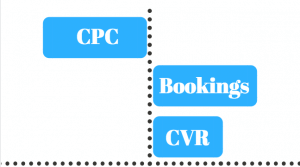
Metasearch is one the most effective channels to drive bookings to in-need properties. The availability of flexible bidding tools in the metasearch channel allows advertisers to be very specific in the way they prioritize budget and target users. By utilizing these bidding levers and internal occupancy data, it is possible to drive incremental bookings where and when they matter most. When done correctly, advertisers are able to improve current campaign performance in the following ways:
- Booking gains of 15% to 20%
- Up to a 10% improvement in conversion rate (CVR)
- A 10% to 20% decrease in cost per click (CPC)
How does it work?
Google offers in excess of 300 bidding multipliers, and of those 300, 10 are designated for Advance Booking Window (ABW). We can customize the ABW multipliers on a property level. The multipliers can be manipulated based on their expected occupancy. This enables advertisers to increase or decrease their presence in particular times of need based on the consumer’s selected check-in date. Combining occupancy data with the Advance Booking Window multiplier can prove to be a powerful tool. This is because we can identify where and when there is a need for more bookings and precisely shift budget as a response. Imagine a scenario in which you only have two properties, Hotel A and Hotel B. On any given day, the occupancy of Hotel A is 95% and Hotel B is 65%. The two properties have the same return, conversion rate, and positioning metrics. Traditional bidding algorithms would consider these properties about equal and would optimize bids for both properties equally, splitting available budget between the two. This approach ignores the fact that there is more availability at Hotel B, and therefore, there are likely more booking opportunities at Hotel B. When we factor in occupancy data, the optimization outcome changes. The algorithm can weigh the need of the property against the opportunity, shifting funds from Hotel A (adopting a less aggressive bidding adjustment) to Hotel B (a more aggressive bidding adjustment), all while maintaining your budget constraints.Results
This optimization technique can decrease average CPC by 10% to 15% while increasing conversion rates up to 10%. The net result, a 10% to 20% increase in bookings. While the theory behind this strategy is relatively simple, implementation can be tricky. Since occupancy changes on a constant basis, an automation tool is required to effectively ingest data and manipulate bids based on the data signals. Fortunately for our clients, this is a set process that the Koddi platform does exceedingly well and will continue to improve. Over time, our machine learning algorithm will get progressively better at refining the adjustments based on occupancy data. We anticipate that results will improve over time. One potential limitation is that only Google Hotel Ads currently allows for the manipulation of bids based on Advanced Booking Window. So applying this approach to all Metasearch publishers is not currently possible. That said, we do anticipate that other publishers will follow suit.
While the theory behind this strategy is relatively simple, implementation can be tricky. Since occupancy changes on a constant basis, an automation tool is required to effectively ingest data and manipulate bids based on the data signals. Fortunately for our clients, this is a set process that the Koddi platform does exceedingly well and will continue to improve. Over time, our machine learning algorithm will get progressively better at refining the adjustments based on occupancy data. We anticipate that results will improve over time. One potential limitation is that only Google Hotel Ads currently allows for the manipulation of bids based on Advanced Booking Window. So applying this approach to all Metasearch publishers is not currently possible. That said, we do anticipate that other publishers will follow suit. How to get started
The beauty of bidding based on occupancy is that it utilizes data you already own. By combining that occupancy data and the bidding platform capabilities of Koddi, advertisers can more effectively manage a large portfolio. This game-changing approach to bidding allows budgets to truly be maximized, targeting the most promising opportunities. While the optimization process is complex, set up through Koddi is very straightforward. Once the occupancy data is available to Koddi, we can implement the algorithm within a matter of days. Don’t miss out on the awesome performance we are seeing and feel free to reach out for more details.You may be interested in
GET IN TOUCH
Ready to get started?
Don’t let your brand get lost in the noise. Partner with Koddi to unlock the power of commerce media and transform the way you engage with your customers. Our team of experts is here to help you navigate complexities and develop a strategy that drives results — no matter what industry – in as little as 45 days.